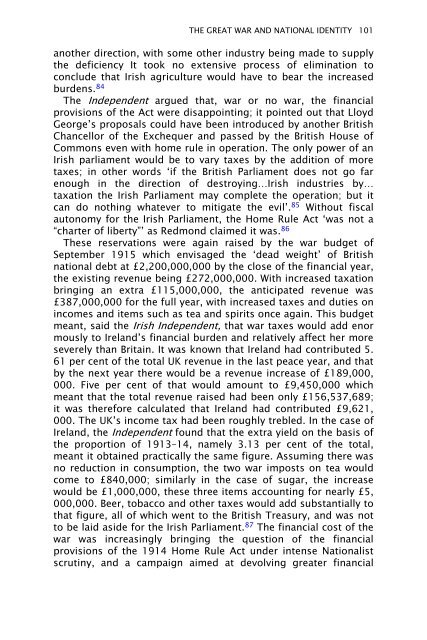Dividing Ireland: World War I and Partition
Dividing Ireland: World War I and Partition
Dividing Ireland: World War I and Partition
Create successful ePaper yourself
Turn your PDF publications into a flip-book with our unique Google optimized e-Paper software.
THE GREAT WAR AND NATIONAL IDENTITY 101<br />
another direction, with some other industry being made to supply<br />
the deficiency It took no extensive process of elimination to<br />
conclude that Irish agriculture would have to bear the increased<br />
burdens. 84<br />
The Independent argued that, war or no war, the financial<br />
provisions of the Act were disappointing; it pointed out that Lloyd<br />
George’s proposals could have been introduced by another British<br />
Chancellor of the Exchequer <strong>and</strong> passed by the British House of<br />
Commons even with home rule in operation. The only power of an<br />
Irish parliament would be to vary taxes by the addition of more<br />
taxes; in other words ‘if the British Parliament does not go far<br />
enough in the direction of destroying…Irish industries by…<br />
taxation the Irish Parliament may complete the operation; but it<br />
can do nothing whatever to mitigate the evil’. 85 Without fiscal<br />
autonomy for the Irish Parliament, the Home Rule Act ‘was not a<br />
“charter of liberty”’ as Redmond claimed it was. 86<br />
These reservations were again raised by the war budget of<br />
September 1915 which envisaged the ‘dead weight’ of British<br />
national debt at £2,200,000,000 by the close of the financial year,<br />
the existing revenue being £272,000,000. With increased taxation<br />
bringing an extra £115,000,000, the anticipated revenue was<br />
£387,000,000 for the full year, with increased taxes <strong>and</strong> duties on<br />
incomes <strong>and</strong> items such as tea <strong>and</strong> spirits once again. This budget<br />
meant, said the Irish Independent, that war taxes would add enor<br />
mously to <strong>Irel<strong>and</strong></strong>’s financial burden <strong>and</strong> relatively affect her more<br />
severely than Britain. It was known that <strong>Irel<strong>and</strong></strong> had contributed 5.<br />
61 per cent of the total UK revenue in the last peace year, <strong>and</strong> that<br />
by the next year there would be a revenue increase of £189,000,<br />
000. Five per cent of that would amount to £9,450,000 which<br />
meant that the total revenue raised had been only £156,537,689;<br />
it was therefore calculated that <strong>Irel<strong>and</strong></strong> had contributed £9,621,<br />
000. The UK’s income tax had been roughly trebled. In the case of<br />
<strong>Irel<strong>and</strong></strong>, the Independent found that the extra yield on the basis of<br />
the proportion of 1913–14, namely 3.13 per cent of the total,<br />
meant it obtained practically the same figure. Assuming there was<br />
no reduction in consumption, the two war imposts on tea would<br />
come to £840,000; similarly in the case of sugar, the increase<br />
would be £1,000,000, these three items accounting for nearly £5,<br />
000,000. Beer, tobacco <strong>and</strong> other taxes would add substantially to<br />
that figure, all of which went to the British Treasury, <strong>and</strong> was not<br />
to be laid aside for the Irish Parliament. 87 The financial cost of the<br />
war was increasingly bringing the question of the financial<br />
provisions of the 1914 Home Rule Act under intense Nationalist<br />
scrutiny, <strong>and</strong> a campaign aimed at devolving greater financial








